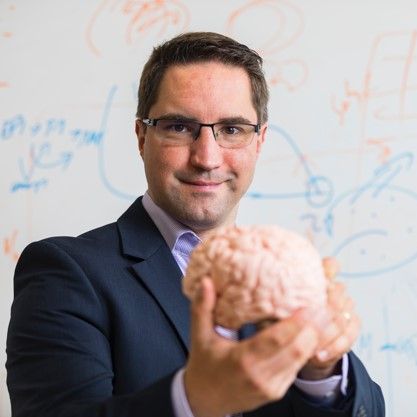The HIDA Lecture Series on AI offers insights into the transformative role of AI in the fields of health, ethics and public administration.

The upcoming events
Next events
Machine Learning for Monitoring Sustainability in the Corporate and Public Sector, 18.09.2025
Sign up for the HIDA Update and get the latest articles, event tips, job postings, and funding opportunities delivered straight to your inbox.
The HIDA Lecture Series on AI offers valuable insights into the transformative role of AI. With a focus on Health, Ethics, and Public Administration, the lecture series shows how AI is revolutionising our lives in a variety of ways while also raising complex moral and ethical issues.
All speakers are highly qualified researchers from the Helmholtz Association and its partners.
Watch again: Past Lectures
- Clinical Large Language Models in Healthcare – Applications, Challenges, and Opportunities Learn more
- Large-Scale Brain Decoding - Taking Advantage of Physiological Diversity Learn more
- Machine Learning for Precision Medicine: Avenues and Roadblocks Learn more
- The Ethics of AI: Foundations of Applied Ethics and Emerging Risks from AI Development Learn more
More HIDA Lecture Series
In collaboration with various partners, HIDA is hosting even more lecture series on topics such as AI, data science and other related topics. Find out more!

The speaker: Anne Torill Nordsletta
The speaker: Anne Torill Nordsletta
Anne Torill Nordsletta is the Department Leader for Innovation and Advising at the Norwegian Centre for E-health Research. She played a key role in establishing the Centre’s Department for AI and Health Analytics and was a co-founder of the national AI in Norwegian Healthcare Service Network (KIN). Anne Torill was also one of the primus motors behind the Norwegian Research Council’s AI billion-application AI Democratization for Human Development (HAIDe). With extensive experience across both public and private sectors, she brings deep national and international expertise in digital health, innovation, and strategic development. Anne Torill is passionate about advancing responsible AI in healthcare and fostering collaboration across sectors to drive meaningful impact.
Clinical Large Language Models in Healthcare – Applications, Challenges, and Opportunities
Abstract:
This presentation focuses on the development and application of large language models (LLMs) in the Norwegian healthcare sector. Language models such as NorDeClin-BERT and NorBERT are already being used for tasks like medical data coding, the detection of adverse drug reactions, and the automated anonymization of patient texts.
Key challenges include the limited availability of annotated datasets, strict data protection regulations, and potential algorithmic biases. Current research efforts aim to address these issues through the use of multimodal AI systems, federated learning approaches, and synthetically generated data.
The overarching goal is to drive innovation in healthcare while maintaining high standards of data privacy and patient safety.

The speaker: Blake Richards
The speaker: Blake Richards
Blake Richards is an associate professor at the School of Computer Science and the Department of Neurology and Neurosurgery at McGill University. He is also a core academic member of Mila – Quebec Artificial Intelligence Institute. Richards' research focuses on the intersection of neuroscience and artificial intelligence. His lab explores the universal principles of intelligence that apply to both natural and artificial agents.
He has received several prestigious awards, including the NSERC Arthur B. McDonald Fellowship in 2022, the Canadian Association for Neuroscience Young Investigator Award in 2019, and a Canada CIFAR AI Chair in 2018. From 2011 to 2013, Richards was a Banting Postdoctoral Fellow at SickKids Hospital.
Richards earned his PhD in neuroscience from the University of Oxford in 2010 and his BSc in cognitive science and AI from the University of Toronto in 2004.
Large-Scale Brain Decoding - Taking Advantage of Physiological Diversity
Abstract:
Decoding neural activity is crucial for neuroscience applications, from sensorimotor research to clinical diagnosis and brain-computer interfaces. Traditional statistical methods struggle with the complexity of brain data, making deep learning essential. However, neural data is highly heterogeneous, posing challenges for model training across diverse subjects, modalities, and conditions.
Blake Richards’ lecture presents novel tokenization techniques for training large-scale transformer-based neural decoding models. These models effectively integrate diverse data—across species, brain regions, and behaviors—improving performance as data diversity increases. This suggests that scaling neural decoding is feasible when models are designed to harness the richness of neural datasets.

The speaker: Simon Eickhoff
Der Referent: Simon Eickoff
Simon Eickhoff ist Professor und Lehrstuhlinhaber des Instituts für Systemische Neurowissenschaften an der Heinrich-Heine-Universität Düsseldorf und Direktor des Institut für Neurowissenschaften und Medizin: Gehirn und Verhalten (INM-7) am Forschungszentrum Jülich.
An der Schnittstelle von Neuroanatomie, Datenwissenschaft und Hirnmedizin arbeitet er daran, die Organisation des menschlichen Gehirns und seine interindividuelle Variabilität detaillierter zu erfassen. Ziel ist es, Veränderungen im Alter sowie neurologische und psychiatrische Störungen besser zu verstehen. Dazu entwickelt und nutzt er innovative Werkzeuge für die groß angelegte, multimodale Analyse von Gehirnstruktur, -funktion und -konnektivität sowie maschinelles Lernen, um kognitive und sozioaffektive Merkmale einzelner Personen vorherzusagen und Anwendungen in der Präzisionsmedizin voranzutreiben.
Machine Learning for Precision Medicine: Avenues and Roadblocks
Abstract:
The lecture discusses the transformation in clinical neuroscience: Instead of the previous approach of comparing markers of brain structure, function or connectivity between groups or correlating them with behavioural phenotypes, advances in data availability and in multivariate statistical learning methods now enable the prediction of individual cognitive or clinical phenotypes. This development has initiated a revolution towards precision medicine.
However, the lecture highlights that the transition from proof-of-concept studies to practical applications might be more complex than often assumed. Technical and biological challenges, such as the limited dimension of biological variability, can compromise the power of predictions.
At the same time, ethical, legal and societal aspects represent significant hurdles for the practical implementation of such technologies and make it necessary to take these into account to a greater extent when developing new approaches in order to go beyond feasibility studies.

The speaker: Theresa Willem
The speaker: Theresa Willem
Theresa Willem is an AI Ethics Consultant at Helmholtz AI and manages the Munich Embedded Ethics and Social Science Hub (MESH) at TUM.
Currently finishing up her PhD in medical AI ethics at TUM’s School of Social Sciences and Technology, her research spans ethical and social aspects of AI and digital health. Theresa contributed to projects like TherVacB, exploring the ethics of patient recruitment via AI-powered social media platforms, and DR-AI, focusing on the ethics of AI applications for radiology and dermatology.
Earlier, she studied media sciences in Regensburg, Berlin, and Brussels and worked in the Berlin health tech startup ecosystem. Theresa Willem is an alumna of the Bavarian Elite Academy and the German National Academic Foundation.
The Ethics of AI: Foundations of Applied Ethics and Emerging Risks from AI Development
Abstract:
Artificial intelligence shapes science, society, and everyday life, but it also introduces new ethical challenges. This lecture provides an introduction to the foundations of AI ethics, exploring sociotechnical systems and core principles such as autonomy, justice, and non-maleficence.
Using medical case studies, the lecture examines issues like bias, model opacity, and accountability. Theresa Willem concludes with strategies such as "embedded ethics," a proactive approach to integrating ethical considerations into the development of AI systems.


